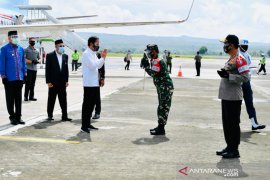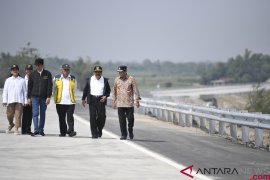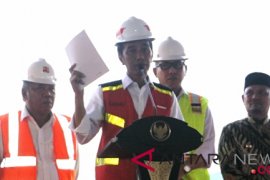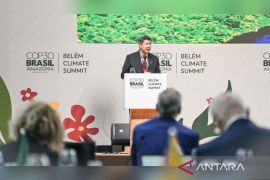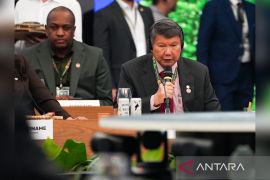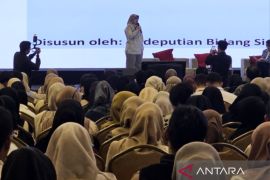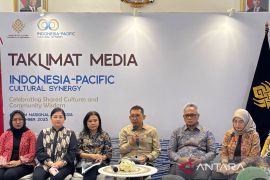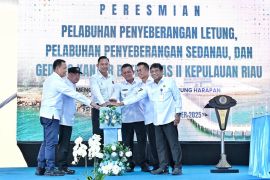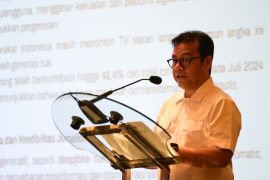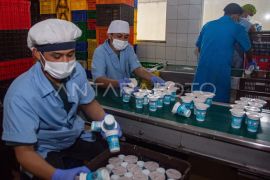The infrastructure sector is perceived as a strength of Joko Widodo`s leadership that could potentially win the hearts and minds of so many eligible voters, particularly those who have felt the direct benefits of various strategic construction projects.
Of course, his contender, Prabowo Subianto, as well as outspoken analysts have their own views and perspectives on the infrastructure projects, including toll roads and the light rapid transit railways the government has built and has been building.
For eligible voters who are yet to determine their political preferences, the second round of the presidential debate will be an opportunity to gain insight into the presidential candidates` views and perspectives.
Jokowi, who will complete his first five-year-term of leadership in October 2019, also has the chance to clarify issues related to his administration`s infrastructure projects that the public needs to know.
As revealed by Public Works and Housing Minister Basuki Hadimuljono, within four years of the Widodo-Jusuf Kalla administration, a total of 941 kilometers of toll roads and 3,423 kilometers of national roads have been constructed.
The Trans-Java Highway, connecting the ferry port in Merak, Banten Province, to Surabaya, capital city of East Java Province, has also been completed, thereby cutting short the travel time and reducing the current logistics costs.
As part of the central government`s prioritized development projects, the toll roads are not merely constructed in Java, but are also built outside the island, such as Sumatra, Kalimantan, and Sulawesi.
In Sumatra Island, the previous government`s idea of constructing the toll roads connecting the ferry port in Bakauheni, Lampung Province, to cities in Aceh Province, was also realized during the term of the Widodo-Kalla administration.
Currently, as noted by the Public Works and Housing Ministry, work on the Banda Aceh-Sigli toll road section has begun, and this 74-kilometer-long toll road, which is one of the sections of the Trans-Sumatra Toll Road, is targeted for completion in 2024.
During his visit to Aceh last year, President Widodo had expressed optimism that the Trans-Sumatra Toll Road, extending some two thousand kilometers away from Bakauheni in the southern part of Lampung to Aceh, would have been completed in 2024.
In connection with the toll roads, one of the critical questions that economists have frequently raised is how significant they are to reduce logistics costs to enable Indonesia`s products to become more competitive than foreign goods.
Outspoken political analyst Rocky Gerung, for instance, has even raised concerns over the negative impact of the completed Trans-Java toll roads on the business activities of ordinary people along Java`s northern coast (Pantura) highway.
Many restaurants and small businesses in various areas along the "Pantura" highway are no longer receiving a sufficient number of consumers because motorists prefer traveling through the newly-completed toll roads over national roads along the highway.
In connection with logistics costs, senior economist of the Institute for Development of Economics and Finance (Indef) Faisal Basri opined that toll roads are not an effective solution to reduce Indonesia`s logistics costs significantly.
In return, the country`s logistics could be strong if the goods were to be transported by vessels instead of trucks, he stated at a press briefing on Indef`s offer for the Strategic Development Agenda of Natural Resources and Infrastructure on Thursday.
The toll roads just helped ease the flow of vehicles joining the annual mass exodus (Mudik), he noted at the press conference, held ahead of the convening of the second round of the presidential debate on February 17.
He believes that the logistics costs can be significantly reduced if land transportation was to be shifted to sea freight. However, only some 10 percent of Indonesia`s logistics are transported by sea, while the remaining 90 percent are still transported by trucks.
Transporting the logistics via land has resulted in expensive costs, as they are transported by trucks through the Trans-Java and Sumatra Toll Roads. However, using sea transport for shipping goods is economical, he explained.
The land freight rate per kilogram is relatively expensive, while the cargo that can be carried by a truck is also limited.
In comparison, the sea freight cost of the Brazilian mango could be reduced to zero, as a cargo ship could transport up to 20 thousand tons, Faisal Basri, a senior economist of the University of Indonesia, stated.
Apart from his view that land transportation is an ineffective solution to the country`s logistics costs, Basri admitted that the constructed toll roads might have reduced the current logistics costs compared to earlier.
The toll roads contributed to the reduction in logistics costs, particularly if the tariffs were adjusted. They also shortened the travel time. However, the cost reduction was, nationally, not significant, and Indonesia`s products would still fail to compete with their foreign counterparts, Basri stated.
A pharmaceutical factory in Medan, the capital city of North Sumatra Province, for instance, preferred importing medicine bottles from Guangzhou, China, to purchase similar products from Java Island due to cost disparity.
He said the price of a container of medicine bottles from Java Island was recorded at US$827, while a container of similar products imported from China just cost US$600, he pointed out.
"The logistics costs can be reduced, but our products are not able to compete with the prices of imported products that are transported by sea," Basri added.
Apart from the critical thoughts that Rocky Gerung and Basri have expressed, incumbent President Joko Widodo is believed to have prepared substantial responses to all questions that are likely to be raised by his contender during the open debate.
The public will see how he defends his administration`s infrastructure-related works over the past five years of his leadership, and eligible voters can gain insightful information before deciding his fate inside the polling stations.
Editing by Suharto
Reporter: Rahmad Nasution
Editor: Suharto
Copyright © ANTARA 2019

